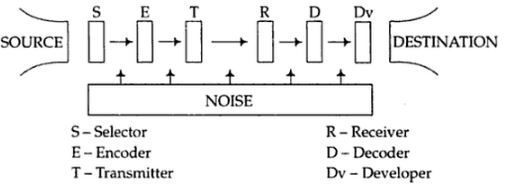I.A. Richards in the ‘Introduction’ to his 1950 translation of Homer’s Iliad:
I have been haunted by the engineer’s diagram of a communication system [from The Mathematical Theory of Communication by Claude E. Shannon and Warren Weaver, University of Illinois Press, 1949]:
Here Homer (…) is the information source. I (…) am the transmitter. I encode certain things my information source seems to give me in a signal which [is sent] through the printed pages that follow. You (…) are the receiver. You take in the marks on the paper which you recode again as sentences and hand on to the destination [= understanding the source]. (…) Further reflection on this diagram makes us aware that its great central gap [of noise] is repeated; that between the information source and the transmitter [on the left-hand side of the diagram], between the receiver and the destination [on the right], as between the transmitter and the receiver [in the middle], come the noises (…) It has been my hope that by a certain simplification imposed on what I took from Homer, [i.e.,] by a certain generality imposed upon my signal [in its language], I might diminish these noises.
Compare McLuhan in his 1974 lecture ‘Living in an Acoustic World’:
my kind of study in communication is a study of transformation, whereas information theory and all the existing theories of communication that I know of are theories of transportation. All the official theories of communication studied in the schools of North America are theories of how you move data from point A to point B to point C with minimal distortion. That is not what I study at all. Information theory I understand and I use, but information theory is a theory of transportation, and it has nothing to do with the effects which these forms have on us. It’s like a railway train concerned with moving goods along a track. The track may be blocked, may be interfered with. The problem in the transportation theory of communication is to get the noise, get the interference off the track and let [the goods, aka the message] go through. Many educators think that the problem in education is just to get the information through, get it past the barrier, the opposition of the young, just to move it and keep it going. I don’t have much interest in that theory. My theory or concern is what these media do to the people who use them. What did writing do to the people who invented it and used it? What do the other media of our time do to the people who use them? Mine is a transformation theory, how people are changed by the instruments they employ. I wish there were a lot more people in this field of transformation, but there are extremely few, and I would be embarrassed to mention more than two or three.1
- McLuhan’s lecture is available online:
http://www.marshallmcluhanspeaks.com/lecture/1970-living-in-an-acoustic-world/
The ‘1970’ date in the URL is mistaken. ↩
